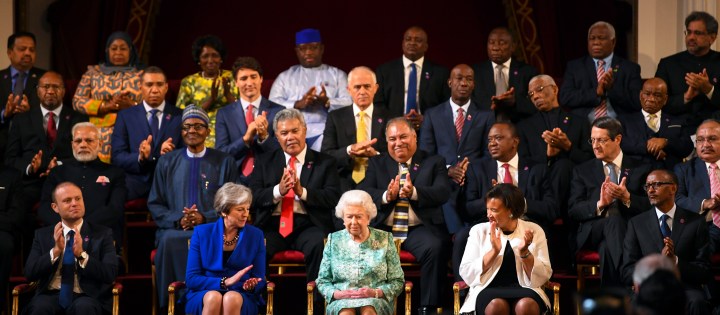AFTER THE BELL
Now that the Queen is dead, what will happen to the Commonwealth?

Many of the Commonwealth’s member nations are likely to be doubtful about the prospect of a rather unconvincing King Charles III — especially when viewed against the backdrop of a world increasingly critical of imperialism.
In case you haven’t heard, Queen Elizabeth II has died and her son, now known as King Charles III, will take over. All of this has been preordained, like the roles themselves — and the family feuding that will keep us entertained long into the future.
Like so many others, I thought the Queen was fantastic; dutiful, moral, understated. She carved out a delicate, difficult path, and did it with great understanding. And, like so many others, I still treasure meeting her, even though the meeting with about 20 other journalists and media bigwigs many years ago was very brief and actually pretty dull. This was deliberate and unremarkable. As Rebecca Mead wrote in the New Yorker’s tribute to the Queen, “Elizabeth led a life made up of privilege and sacrifice, and even those who resented the former acknowledged the latter.”
About Elizabeth there is a lot to be said, and also ironically very little. Only once in her 70-year reign did she step off of her preordained path, and that was done so hamfistedly, she never did it again. The incident was the infamous off-the-record briefing in 1986 in which the Queen allowed it to be known that she favoured sanctions against South Africa, a position supported by the majority of the Commonwealth nations.
The position was in contrast to that held by then UK Prime Minister Margaret Thatcher, who was against sanctions and felt negotiations were the best way to persuade South Africa’s white-minority government to dismantle apartheid.
The Queen, as representative of the Commonwealth, essentially took the side of the organisation against the policy of the British government. But, in doing so, she was treading a delicate constitutional line, since British royalty are supposed to have no role in government.
The carefully concerted leaks, almost identically phrased, appeared in five newspapers. But to avoid the constitutional issues, Buckingham Palace refused to confirm that these were the views of the Queen.
In the TV drama The Crown, when Thatcher confronts the Queen about the issue at one of their scheduled, weekly meetings, Elizabeth tosses it off, saying: “Oh, you shouldn’t believe everything you read in the papers.” There is no knowing whether this is true or not.
The palace press officer was subsequently fired, even though it was undoubtedly the Queen’s idea. In the end, the Commonwealth did adopt limited sanctions, so I guess you could say she won.

A regiment of the Household Division Foot Guards march with Commonwealth countries’ flags during the Platinum Pageant celebrating Queen Elizabeth II’s Platinum Jubilee in London, Britain, 5 June 2022. (Photo: EPA-EFE / ANDY RAIN)
Visit Daily Maverick’s home page for more news, analysis and investigations
Merely voluntary
The Queen was nominal head of the Commonwealth and her title in each of the 15 Commonwealth “realms” is also secured by law in those countries. For the rest of the 49 countries now part of the Commonwealth, it is merely a voluntary association and the successor to the crown does not automatically become the new head.
Clearly, there was a notion that Prince William, Duke of Cambridge, might take over the job. He undertook a tricky visit to the Caribbean recently where six countries are in the process of removing the Queen as the head of state.
At their meeting in April 2018, however, Commonwealth leaders agreed that Prince Charles, now King Charles III, should succeed his mother as head. But the dice were pretty loaded. The Queen, then aged 92, asked the leaders to make that decision, and they were hardly likely to push back against the wishes of a distinguished person.
The British public, although it probably doesn’t like to admit it, is going to be a bit quizzical about their new ham-fisted king. But that is nothing to how doubtful the nations of the Commonwealth are likely to be about the slightly unconvincing King Charles III against the background of a world increasingly critical of imperialism.
And yet, for all the anger and resentment about the colonialism that gave rise to the organisation, the Commonwealth remains popular, and world leaders clear their diaries to attend its functions. In some ways, the Commonwealth endures precisely because of its unusual structure, in which a whole collection of very small nations get to rub shoulders with very big nations, decisions are made by consensus, and it’s all about tradition and not about rules.
I have attended two Chogms (Commonwealth Heads of Government Meeting). At one, I met a stranger at the hotel bar and I asked him what he did. He said he was the prime minister of Papua New Guinea. I didn’t quite know what to say.
For small countries, the Commonwealth does provide something of a platform. When Barbados decided to sever the link with the British monarchy last year when it became a republic, it remained part of the Commonwealth. King Charles III attended the function!
Still, the consensual nature of the grouping also means nothing is ever really decided. With huge novelty and creativity, the organisation has taken up the issue of, you won’t believe it, climate change. In a way, the decision unwittingly demonstrates its weakness: the Commonwealth is really not the right format to address mega-international issues like that, but it is a popular and important issue, so, what the heck. And at least Charles III understands the issue a bit.
Follow Daily Maverick’s ongoing coverage on the death of Queen Elizabeth II, the meaning of her legacy and what happens next with King Charles III
In May, when Reuters asked Philip Murphy, a professor of British and Commonwealth History at the University of London, what he thought the future of the Commonwealth was, he replied: “I think perhaps the Commonwealth has historically run its course. And what you’re really seeing now is the ghost of an organisation.”
I have a British friend who thinks countries will gradually peel away from the organisation. “I think the only country that should be forced to remain in the Commonwealth is Australia, since it annoys the right sort of chippy Aussie in a reliably amusing way.”
Personally, I think the Commonwealth should rediscover its roots, which were all about trade. For all of its other issues, the British Empire was once a free trade zone, and that did help some nations find their feet. But I doubt there is much appetite for that in the organisation. Too bad. BM/DM
















Who cares ?
Those who recognize that irrationality is an integral feature of human life – of individuals and collectives.
The Queen did not die with the institution of the monarchy in the UK. The Commonwealth as a person who has participated in its programs during the liberation struggle was very pivotal in the struggle against Apartheid and the eventual success of sanctions. The ANC and PAC attended the CHOGM meetings with religious zeal to use its platforms to campaign against Apartheid it was in 1985 following the Nassau CHOGM that the Eminent Persons Group was appointed with leaders from various Commonwealth countries. The Commonwealth has programmes of educational and cultural exchange that have been funded by UK, EU and Australia. The Queen visited this country in 1995 and November 1999, CHOGM was held in this country. The group has grown to be an institution for networking and expansion of trade relations among member states and as a platform to discuss human rights issues as it was shown in Nigeria and Zimbabwe. Like Christianity and Christian churches that have been part of colonialism, the Commonwealth has redefined itself and made itself relevant in the contemporary international system. You have the Commonwealth Trade Union Council that supported COSATU and NACTU during the struggle and helped with education of members. We share in the sorrow of the British people and mourn with them the passing of their sovereign. We are not political vandals with no sense of history or humanity.